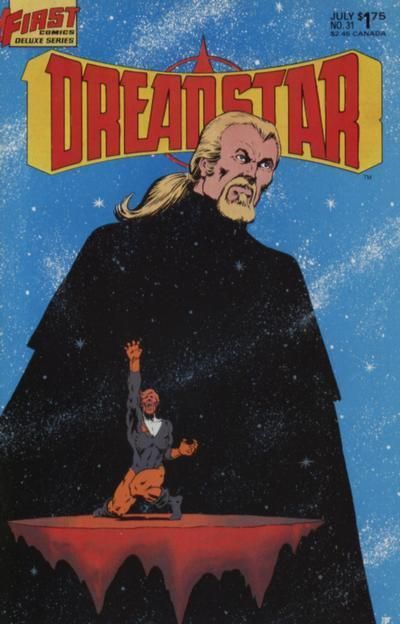It all ends here.
Dreadstar #31 ("The Healing Dream") by Jim Starlin marks the end of The Metamorphosis Odyssey book four. For me at least. Book five is made up of the rest of Starlin's run, which began in issue 32 where he shifted to writing the book but not drawing it with an issue where someone else did the finishes. This issue is both epilogue and recap. It presents Vanth Dreadstar's entire life as he lies in a coma after his final fight with the Lord High Papal. He and the Power go through his life, showing their time together. That is until we reach his present and the physical embodiment of the Power, a female, appears and they have sex on a floating rock in the middle of what looks to be his brain. Visually, it recalls The Death of Captain Marvel, but the Power is different from Death. This issue is that story's opposite number in a sense. Where Mar-Vell succumbs to Death at the end, accepting it, Vanth succumbs to the Power and accepts it... and, as a result, leaves 'her' behind to return to his life. He's lost his ability to fly and the energy fist as a result of the Power healing him and saving them both. He'll return weaker, slowly but surely becoming more mortal. When Vanth comes out of his coma, Oedi is there and he's told that he's been in the coma for two years, leading into the new status quo that's set forth in the next issue.
The recap of Dreadstar's life is interesting since Starlin spends most of his time on the pre-Dreadstar material. Once he hits where the series began, it's quickly breezed over, most of the emphasis is placed on the events of The Metamorphosis Odyssey and the Dreadstar graphic novel, two works he recognised as coming out of one the happiest times in his professional life. They're slighter and smaller works, but ones that still hold a meaningful and large place for him. Dreadstar the series is a more impressive work, one that shows Starlin at the top of his game, both as a writer and as an artist, but it was the book where he lost his passion under various burdens. It was something that took years to create... it was the job, the other two were the works of passion. It's disappointing that this issue spends so little time on the series.
The end of the issue feels wrong. The parallel to The Death of Captain Marvel isn't accidental, but it seems like Dreadstar should have died, that this should have been the official end of the fourth book with the next storyarc building on what came before, focusing on the other characters. That seems like where Starlin was heading with this issue -- Dreadstar embraces the Power and they die together, unable to overcome the injuries sustained against the Lord High Papal, the issue ending very much like the end of The Death of Captain Marvel, the other characters watching as Vanth dies. But, that would have ended the book. I honestly don't know if Starlin ever considered that direction, if he wanted to head that way... but, it feels like where this issue was heading, where the finale of this entire story about the war and the Instrumentality and the Lord High Papal was heading. Vanth finally dies, his life flashing before his eyes, and embracing the Power/Death. It would have been a retread, but an appropriate one.
That it doesn't end there is a testament to the biggest problem of Dreadstar: despite it being a book of change, it also couldn't go too far, and moved into a position of simpler storytelling and superhero tropes. Vanth Dreadstar shifts from a fantasy hero with his hoodie and sword to a superhero with his super-strength and skin-tight costume. The complex idea of ending a war by playing both sides becomes a fight between good and evil. The book would introduce ideas and discard them without exploring them like Maxilon the robot savior created to fight against the Church of the Instrumentality. Starlin seemed to want to do something genuinely different from everything else, but kept getting pulled back to the familiar.
All the same, it was a remarkable work. Starlin showed inventiveness in his art, clearly using techniques that prefigured works like Watchmen, and showing a fearlessness in throwing out surprising stories that had characters die or have big, shocking reveals. Starlin wasn't afraid to try new things or shake up the status quo, even if was temporary or less complex. He wasn't afraid to have characters question his hero and suggest that the guy was a failure. More than one, the bad guys won. And even when the good guys won, there was always a price. That's why the end of this issue isn't satisfying: it negates the cost. Two years lost for a man that's immortal basically? Vanth Dreadstar needed to die.
And that's all I have to say right now. Maybe someday, I'll write about the final issues that Starlin wrote and Peter David's tenure on the book (including the six-issue mini-series he wrote in the '90s about Vanth's daughter). It's been fun, but December and 2010 are over now. Thanks for reading.


